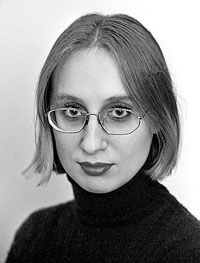The Dialogue Political Club held a regular session recently, with the philosopher Myroslav Popovych and political scientist Volodymyr Polokhalo (both well known in their fields) discussing two topics: The Political Culture of the Average Ukrainian and Ukrainian Elite as well as Poverty as not Just an Economic Indicator but Also a Factor Paralyzing any Democratic Initiative and Democratic Trend.
UKRAINIANS WILL BE SAVED BY HEALTHY EGOTISM
Volodymyr Polokhalo believes that the average Ukrainian’s political culture is that of a vassal (in Weber’s sense) or an onlooker. Its basic characteristics include lack of confidence in other people, the powers that be, and politics in general. Relying on decades of bitter experience, the Ukrainian man in the street knows that all changes and every initiative in Ukraine, past and present, come from on high, and that in this process his role is reduced to that of a passive onlooker. Still, Mr. Polokhalo stresses that “the people love those in power and help them remain self-sufficient... Democratic progress is not necessarily what lies ahead. Post- Soviet realities show that other scenarios are possible. Our level of political culture is close to that of Belarus and Russia where authoritarian trends are clearly apparent, and we are drifting away from Poland and the Czech Republic in historical time.” One of the main reasons of this pessimistic situation in Ukraine is the people’s chronic misery. The analyst says that “poverty is not just an economic indicator, but also a factor paralyzing any democratic initiative and democratic trend.”
Philosopher Myroslav Popovych agrees: “I am afraid that Ukraine will become a little Colombia or something of the kind in the hallway of Europe. A place for ОmigrО sojourners and drug-trafficking crossroads. A venue of chronic poverty.” And the people are not to blame, he continues, because “corporate responsibility is not a European notion. What we have is the responsibility of separate individuals and organizations.” As for the masses, the philosopher maintains that they are denied access to political experience and that one of the reasons is their poverty and humiliating status, because often they simply cannot afford to buy a newspaper or watch any other news but UTN [government channel’s newscast], etc.
Other participants in the discussion offered many reasonable ideas and constructive recommendations, yet the overall impression was that most in the audience — people representing the so-called cultural elite — did not hear or would not listen. They became attentive only when hearing the word patriotism from the podium (“Don’t you think that patriotism is the basis of life of any state?” — spoken in the local stilted Russian-Ukrainian vernacular). Also, some excitement was caused by the presence of a reporter from the Kievskie Vedomosti who had the nerve to ask a question in Russian. After that practically everyone taking the floor would use a couple of expressive epithets to stress his scorn for the newspaper and, of course, the reporter in attendance. As though aware of what would happen, Volodymyr Polokhalo started his presentation [before the reporter’s question and the response from the audience] by declaring, “The patriotism of our so-called culture elite is abominably formal, harmful, and biased in view of the current reality.” Myroslav Popovych, in response to accusations of collaborating with the “Yids” and “Katsaps” (a not overly polite term for Russians — Ed.) tried to explain that “political culture is not humdrum but an ability to be tolerant in adjusting to different stands.” Finally, discussing the political culture of the Ukrainian elite did not seem to make much sense, because (a) it was hard to identify that elite, and (b), considering Prof. Popovych’s assumption that the notion of elite comprises the highly qualified strata of the Ukrainian people, practically everyone in the audience could produce IDs attesting to his/her belonging to that elite, and, of course, the audience’s political culture required no comment.







